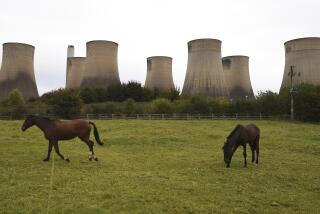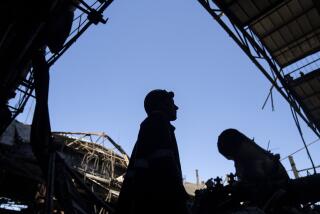Fire Shuts Down Chernobyl-Style Reactor
MOSCOW — A flash fire Monday at a controversial nuclear power station in Lithuania damaged cables used to control and monitor a Chernobyl-style reactor, causing it to be shut down, a senior Soviet official said.
The official, quoted by the Tass news agency, said there were no injuries and there was no radiation leak from the five-year-old reactor at Ignalina, which Soviet energy publications have said is the largest nuclear plant in the world. It produces 1.5 million kilowatts of electricity.
The reactor, one of two at the plant about 400 miles west of Moscow, is a carbon copy of the one at Chernobyl in the Ukraine that exploded in April, 1986, killing 31 people, forcing the evacuation of 135,000 more and sending a deadly radiation cloud over much of Europe and the western Soviet Union.
Power for Baltic Republic
The giant Ignalina reactors drive two 750-megawatt turbine generators that produce electricity for the Baltic republic.
The chief dispatcher of the Soviet Atomic Power Ministry, Erik Pozdyshev, told Tass that the reactor’s safety systems automatically kicked in and that the fire had already been put out by the time firefighters arrived.
He said no radiation escaped the plant, and there were no injuries among the public or plant employees. The reactor was shut down after the accident, Tass said.
The news agency’s prompt reporting of the fire reflected the new official policy under Soviet leader Mikhail S. Gorbachev’s drive for more openness, especially about important events such as accidents.
“Considering the heightened public interest in nuclear reactor operations, which is quite understandable after the Chernobyl accident, we decided to inform the public about what has happened at the Ignalina station at once,” Pozdyshev said.
Ignalina, an example of the Soviet penchant for “bigness,” has been surrounded by controversy since it went on line in 1983. Last June, Stockholm’s Swedish Defense Research Establishment said it registered four separate discharges of radiation in three months at the power station.
It said the discharges, although not health threatening, indicated poor safety standards at the station, about 450 miles east of Sweden.
Lithuanian nationalist groups have criticized it as unsafe and badly constructed.
More to Read
Sign up for Essential California
The most important California stories and recommendations in your inbox every morning.
You may occasionally receive promotional content from the Los Angeles Times.










